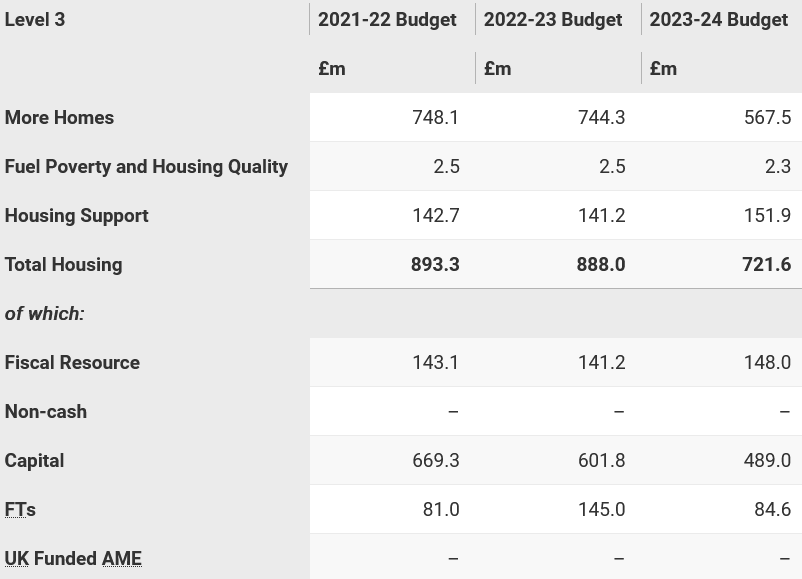Budget outlines net zero priorities but cuts affordable housing funding

Scotland’s transition to net zero has been boosted with increased investment of over £366 million in delivering the Heat in Buildings Strategy in 2023-24 as part of the Scottish Government’s budget yesterday.
Delivering the statement to Parliament yesterday, Deputy First Minister John Swinney said developing and investing in a strengthened policy and delivery framework for green homes and buildings including delivering the Heat in Buildings strategy will see a million homes and buildings decarbonised by 2030.
Meanwhile, around £34m is expected to be raised by increasing the Additional Dwelling Supplement from 4% to 6% from 16 December 2022, which is paid as part of Land and Buildings Transaction Tax (LBTT) on additional properties.
Faisal Choudhry, director of residential research at Savills, said: “The increase in the Land and Buildings Transaction Tax Additional Dwelling Supplement from 4% to 6% from 16 December means that buyers in Scotland will now pay double the rate compared to England and Northern Ireland and 2% more than Wales. The purchase of a £300,000 additional dwelling in Scotland will therefore incur an extra £6,000 in tax as a result.
“Mortgaged Buy to Let has become less profitable for individual investors and landlords since 2016 and as a result Buy to Let’s share of outstanding mortgages across the UK has stagnated at 17-18%. Further headwinds were unveiled in the Autumn statement as Jeremy Hunt announced a reduction in Capital Gains Allowance.
“At a time when there were 29% less properties listed for rent this year in Scotland compared to 2016 according to Rightmove, the increase in additional rate is likely to put more pressure on students and young professionals, especially given the challenges in purchasing a home due to the rapid rise in mortgage rates and reduced availability of mortgage products since the end of the September.
An opportunity has also been missed to raise the house price threshold above which LBTT is levied and to also increase the nil-rate threshold for First Time Buyers’ Relief. This would have provided further support to those on the first rungs of Scotland’s housing ladder, matching similar measures already enacted in the rest of the UK.”
Fiona Hodgson, chief executive of the Scottish and Northern Ireland Plumbing Employers’ Federation (SNIPEF), said funding needs to prioritise developing the skilled workforce to deliver a transformative green agenda.
Fiona added: “The government’s transformative Net Zero agenda is welcomed and supported by our sector; however, we urge greater priority is given to the skills development of the people needed to realise these already challenging targets.
“It is critical that apprenticeship funding is focussed towards developing the essential skills of our next generation of plumbers and heat engineers, as well as upskilling the current workforce in areas such as heat pumps.
“By ensuring the people with the needed skills are recruited and developed today and in the future, the government can showcase to the world that the green economic model contained within their Net Zero ambitions is both viable and sustainable.”
Fabrice Leveque, climate and energy lead of WWF Scotland, said: “It’s good that one of the Deputy First Minister’s priorities for this budget is achieving our net zero ambitions. However, it doesn’t go far enough. Scotland’s climate targets have the potential to create jobs, develop new industries and improve health, all whilst restoring our environment. At a time of economic constraint, all public spending must bring down emissions and build an economy and country that’s fair for all and fit for the future.
“We welcome the commitment to continued investment in sustainable agriculture. There must now be action to ensure that all spending on this sector is more effective, using the forthcoming Agriculture Bill to create a system that delivers for nature and our climate, whilst also delivering a just transition for those working in it.
“Spending on energy efficiency and greener heating is an essential step to tackle both the climate and energy crises that we face. It’s crucial that the full budget for greening home heating is spent over the coming years to make sure that as many homes as possible benefit.”

Elsewhere, housing bodies have criticised the Scottish Government for reducing its funding for the Affordable Supply Programme.
According to the budget papers, the amount to be invested in housing during 2023-24 will be £721.6 million, a fall from £888m and £893.3m in the previous two years. Within this spending plan, the More Homes funding has dropped from £748.1m in 2021-22 and £744.3m in 2022-23 to just £567.5m for the upcoming year.
Meanwhile, having already increased the unique Scottish Child Payment to £25 per week as part of a drive to eradicate child poverty, the budget invests £428m to uprate all other devolved benefits in April 2023 by September’s Consumer Price Index inflation level of 10.1%. It also commits £20m to extend the Fuel Insecurity Fund to provide a lifeline for households, including the most vulnerable, against rising energy prices.
And the country’s transition to net zero is boosted with an increased investment of over £366m in delivering the Heat in Buildings Strategy in 2023-24. This will help tackle fuel poverty as part of a £1.8 billion commitment over this Parliament to improve energy efficiency and decarbonise more than a million Scottish homes by 2030.
However, the housing bodies, which called for an increase in new homes funding, have argued that the reduction does not fit with the government’s focus to reduce poverty in Scotland.
Callum Chomczuk, national director at CIH Scotland, said: “This budget risks stalling the real progress made over the last eight years in increasing the supply of affordable housing in Scotland and reducing housing need. In real terms, the budget for ‘more homes’ is 70% of the equivalent budget for 22/23 and that is without considering higher new building standards and probable limitations on social landlords setting their own rent levels post-March 2023.
“As we approach the mid-point of the Parliament, we called for additional investment so completions could gather pace and the Scottish Government could meet its target of delivering 110,000 affordable homes, and decarbonise existing stock by 2032.
“Instead, the budget for new affordable homes has been reduced by over £200m in real terms which makes the challenging target of 110,000 affordable homes target even more difficult. Indeed, given the understandable focus on the twin pressures of the climate emergency and the cost-of-living crisis, it is disappointing that the budget did not prioritise investment into one of the key areas that would support both these outcomes - building social housing.”
Sally Thomas, chief executive of the SFHA, added: “We welcome the Scottish Government’s aim in this budget to try and provide further support to those in greatest need, with increases to Scottish social security benefits and £20m to extend the Fuel Insecurity Fund in 2023/24, which should help tenants who are struggling with spiralling living costs and heating bills.
“However, social housing provides one of the greatest protections against poverty, and we are alarmed to see a cut to the Affordable Housing Supply Programme which, coupled with continuing uncertainty over rent setting and inflationary pressures on costs, seriously threatens our members’ ability to build homes. A budget decrease of any amount will still reduce the number of homes our members can build, and we urge the government to rethink this cut if it’s serious about tackling poverty in Scotland.”
David Bookbinder, director of the Glasgow and West of Scotland Forum of Housing Associations, added: “The previously allocated £636m grant funding for the new supply programme has been cut by £55m, which is around 9%, before high inflation is factored in. Any such cut is always regrettable.
“In this case, there’s a question over whether the cut reflects any expectations that the original budget may not have been fully spent because of unwillingness on the part of some councils and/or the Scottish Government itself to fund new build at current prices.”
















